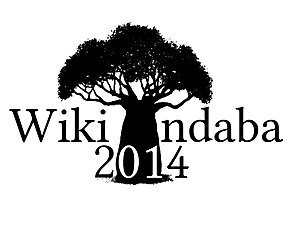Wikimedia Blog/Drafts/Africa's first Regional Conference gathers Wikimedians in Johannesburg
This was a draft for a blog post that has since been published at http://blog.wikimedia.org/2014/07/25/africas-first-regional-conference-in-johannesburg/
Title
[edit]Africa's first Regional Conference gathers Wikimedians in Johannesburg
Body
[edit]


This past June, Wikimedia South Africa hosted more than 35 Wikimedians in Johannesburg for the first ever Wiki Indaba Regional Conference. All four regions of Africa were represented by at least one country, with West Africa having the lion's share. For three days we talked about the challenges and possible solutions for initiating wikipedia editing communities in the continent in an effort to fulfill our vision of sharing the sum of all human knowledge with the world.
We left the conference with a renewed sense of purpose and a united goal to create wikipedia editing communities in our respective countries through clear communication channels and co-operation plans, even though we were reminded that we don’t have a magic wand to accomplish this overnight.
The first day was spent listening to delegates recounting community efforts in their home countries, the unique challenges they face as well as their future plans. We learned how group dynamics and diversity helped Tunisia acquire their status as a Newly recognized African user group. From Egypt we heard about how universities are responding to Wikipedia. From Côte d'Ivoire and Cameroon we learned of local efforts from WiR at the Africa Centre and how they are linking up with local academic and art institutions to expose the public to Wikipedia. We learned of grass root efforts in Ghana and Nigeria where they've actively reached out to schools and the general public. We heard how difficult it is to arrange events without the approval of local authorities. From Cameroon we learned how Wiki Loves Monuments improved acceptance of Wikipedia. From Ethiopia we learned about the dangers faced by bloggers and how Wikipedia is often mistaken for Wikileaks. We learned how some Wikipedians have actually been incarcerated for blogging. Representatives from Malawi and Tanzania discussed how Wikipedians are fusing their entrepreneurial skills with open knowledge. From Kenya we learned of efforts to regroup and pursue chapter status. We learned of the efforts of university students to build a community in Botswana. Namibia highlighted its renewed effort to experiment on oral citations as a way to create acceptance of local and indigenous knowledge through Wikipedia. We learned of community efforts in South Africa, which still is the only chapter in the continent. At the end of the day, we reviewed statistics of African language wikipedias and gathered as many insights as possible. The day was completed with a presentation on Wikimedia Foundation's global south strategy and how it is poised to assist communities throughout the continent.
After a refreshing social event in the heart of Johannesburg, We were back for Day 2 and onto business. Delegates got a chance to interact with the Wikimedia Foundation grants team (Anasuya and Asaf) and ask them important questions regarding available funding opportunities to enable them to run outreach events in their countries. Many misconceptions were dispelled and delegates gained confidence in planning future projects with the assurance that funding and support will be available when they need them. The Wikipedia Zero presentation (Adele) was awe inspiring and instilled a sense of excitement when delegates learned about recent developments in their own countries. Deeper understanding on the technology and its potential impact in the continent was shared with delegates. The afternoon session was divided into two tracks running concurrently, where insights on exceptional local projects in education and copy right issues were discussed. We listened on how mission aligned thematic organizations can complement local community efforts in increasing Wikipedia's reach and understanding. The day was capped by a social event hosted by Creative Commons ZA, where a movie on copy right highlighted issues brought to light by entities like The Pirate Bay and the European Law suit against their peer-to-peer online content sharing.

The third and final day of the conference saw exhausted delegates wrap-up the conference with local success stories such as Omaheke - Namibia's outreach and research sandbox. Wikipedia Primary Education, Wikipedia Education Program in Egypt, The Siyavula Open Education portal in South Africa as well as Mesh Sayada, a free community network for open data and free culture in Tunisia were all showcased. An evaluation of Wiki Loves Monuments successes in South Africa was discussed. The session culminated with the announcement from project Wiki Loves Africa which will be a photographic competition modeled after Wiki Loves Monuments concept.
At the close of the conference, delegates were requested to write down personal pledges on how they plan to continue and increase their efforts to build editing communities in their countries. These were documented and will be sent back to delegates to remind them of their personal pledges. Delegates also deliberated on the best ways to stay connected as a group through discussions on Meta, in social networks as well as the creation of an African-Mailing list.

As captured by the program director in his closing statements, there are no expectations that this conference will magically result in super active editing communities in Africa, however there is now hope that an organized group of dedicated volunteers will work together to spark the much needed wikipedia editing communities in the continent - one step at a time.
(Watch videos from the conference participants on Youtube here. Complete conference documentation is available on Meta-wiki and more pictures of the conference can be seen on commons. Many thanks to our wonderful hosts at Wikimedia South Africa in Johannesburg for a well-organized event and to all participants for sharing their knowledge and experiences at this conference. We look forward to continuing this conversation in the coming months).
Dumisani Ndubane, Project lead, Wikimedia ZA
